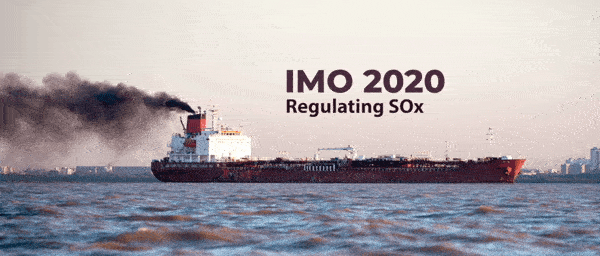IMO 2020: Making Maritime Green
March 5, 2020 | Expert Insights

Understanding IMO 2020
The International Maritime Organisation (IMO), the United Nations (UN) body that regulates international shipping has issued the IMO 2020 which aims to cap sulphur-dioxide emissions on 1 January 2020. The global upper limit for the shipping industry stands at 3.5% today and will be reduced to 0.5%.
The regulation has entered into force as of 1 March 2020. It does not exempt any ships. Only ships fitted with sulphur-cleaning devices or exhaust gas cleaning systems, known as scrubbers, are allowed to continue burning high-sulphur fuel.
The IMO regulations to reduce sulphur oxide emissions from ships first came into effect in 2005, under Annexure VI of the International Convention for the Prevention of Pollution from ships, also known as the MARPOL convention.
Shipping: poisoning the oceans
Ships emit pollutants and other harmful emissions, but they also transport large quantities of vital goods across oceans. According to the United Nations Conference on Trade and Development (UNCTAD) data, in 2016, ships ferried more than 10 billion tons of trade for the first time. In comparison to other forms of transportation, the shipping industry has been the most energy-efficient. The new regulation means a 77% reduction in sulphur-dioxide emissions from ships that are equivalent to nearly 8.5 million tons annually.
Ships have traditionally used heavy fuel or "bunker" oil which is derived as a residue from crude oil distillation. This crude oil contains sulphur, following combustion, ends up as emissions.
What are the alternative fuels?
Carriers can opt for cleaner fuels, such as marine gas oil (MGO) and very low-sulphur fuel oil (VLSFO). Evaluating companies have claimed that VLSFO produces high sediment formation that could potentially damage engines. VLSFO with 0.5 per cent sulphur content, produces black carbon due to incomplete combustion, and this contributes to climate change. The Clean arctic alliance, called for the ban of such fuels and as it would accelerate the melting of the arctic sea ice. The IMO sub-committee on Pollution, Prevention and Response (PPR 7) is to discuss these concerns and submit its observation in October 2020.
This new sulphur regulation has compelled ship owners and operators to reflect the best option that would be available for them. Refiners are considering a shift to produce more low- sulphur fuel, in anticipation of increased demand.
India perspective
Indian ports are running low on marine fuel that is compatible with the new cap on sulphur emissions. Indian refineries concede that the current production is approximately 80,000-90,000 tons per month, while the demand is above 150, 000 tons per month.
The lack of available 0.5pc fuel oil, compatible with the International Maritime Organisation (IMO) rules, threaten to disrupt shipping on India's east coast unless vessels use marine gas oil (MGO) or high-sulphur fuel oil (HSFO). The latter can now only be used by vessels with exhaust scrubbers.
Indian state-owned HPCL has started production of IMO-compliant marine fuel oil at its Visakhapatnam refinery on the east coast. It is unclear how much fuel of the same grade the company can produce at its Mumbai refinery on the west coast. Indian Oil Corporation's (IOC) total marine compliant fuel production capacity is pegged around 1mn tons per year which is roughly the same as India's domestic demand.
Criticisms of the regulation
Six of the eight Arctic countries, Norway, Sweden, Finland, Denmark, the United States and Iceland currently support the new ban on sulphur emitting fuels. Russia and Canada, the two countries with the largest arctic coastlines, do not favour the new norm. UAE, for example, contributes to the most traffic, has stated that it will be flexible. China wants the implementation to date to be delayed.
Critics feel that the IMO rules will significantly increase the cost of transportation of goods required on a day to day basis.
Assessment
- Fuel tariff constitutes 60 to 70 per cent of the total cost of ocean freight. An increase in fuel costs would naturally raise the costs of imports and exports. The world body must consider the most opportune time to implement such a decision when world trade is at crossroads is now when the coronavirus and U.S.-China trade war is assailing the world economy.
- It will be challenging to detect violators as there is no central regulatory mechanism. Every country will have to enforce the IMO 2020 within its territorial waters.
- Air pollution kills an estimated 7 million people every year. The IMO has stated that this regulation could be beneficial to human health, prevent acid rain and ocean acidification. The intent of the IMO, in reducing maritime pollution must be lauded, as it is in line with the demands of climate activists to combat climate change. The effect of alternative fuels too must be examined thoroughly. Countries and the shipping industry could have done better with more than two months' time to make the transition in fuels.
Image Design: Chris Karedan, Synergia Foundation








Comments